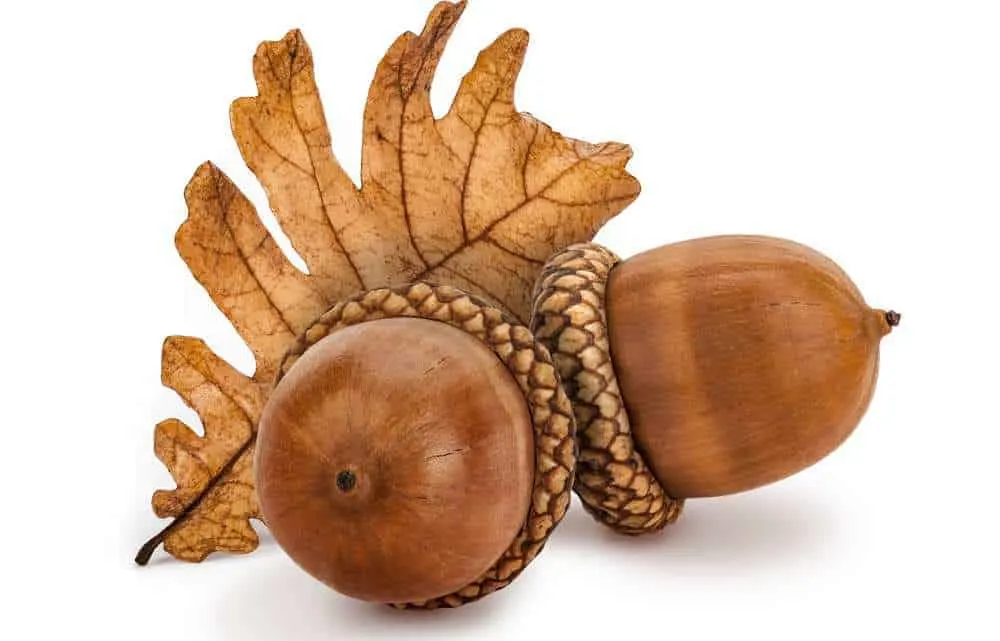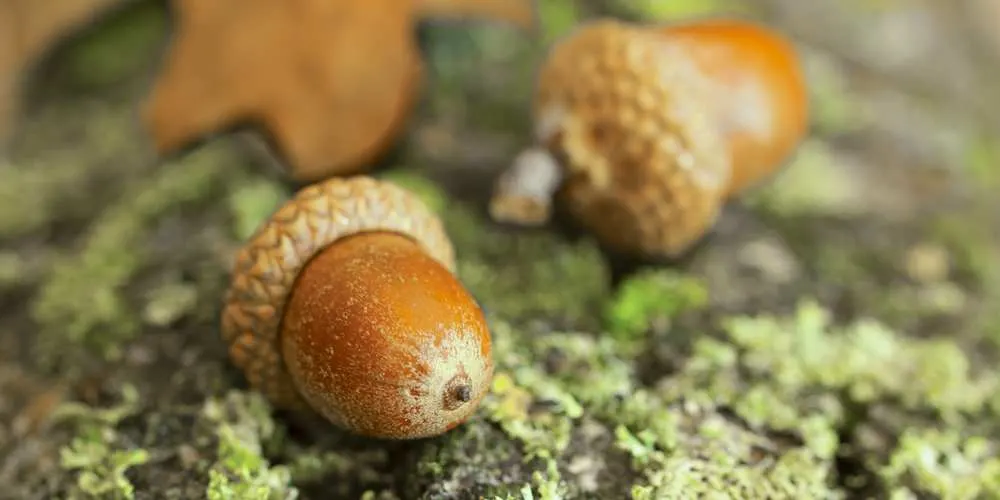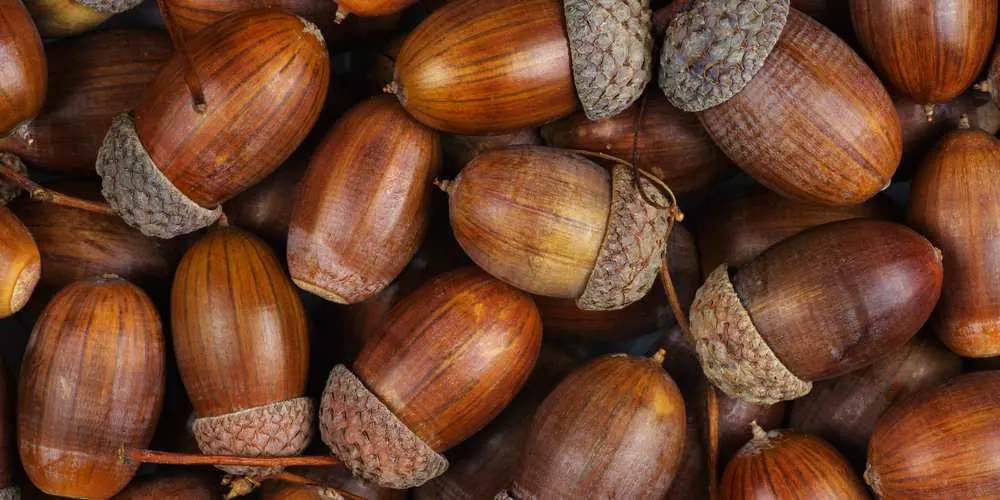It’s autumn and it’s finally time for acorns to fall from the oak tree. On your way to the park, your dog might pick up a slice of pizza or a piece of popcorn on the sidewalk, but is your dog allowed to pick up some acorns as well?
September and October are an ideal time for a relaxing walk in the park, surrounded by golden-colored leaves and crunchy acorns for squirrels laying on the ground. However, sometimes this food is not as harmless as it looks.
Stay with us and don’t miss out on the opportunity to find out why acorns and dogs simply don’t mix, their ecological role, and how to save your dog from picking up this toxic food.

Can Dogs Eat Acorns?
No matter how toothsome this might appear to your dog, you must not let him near this oak tree fruit!
Acorns are harmful to your dog because eating them can easily cause diarrhea, vomiting, lethargy, and abdominal pain. There doesn’t have to be a large time gap before these symptoms kick in and your dog fails to function normally.
You shouldn’t be worried too much if your dog has chewed on just one acorn, but if you let him out of your site and find him engaging in several acorns at the same time, you should be alarmed!

Learn About Acorns
Although acorns are highly nutritious, they are not edible when raw. They contain tannins which makes them bitter. This ingredient is known for giving food that unique “mouth feel”. Acorns were a popular treat all over the world and have been a part of menus in various cultures. This oak tree fruit is packed with healthy ingredients and is low on calories.
Here’s a closer look:
A 1-ounce serving of dried acorns contains:
| Calories | 144 |
| Protein | 2g |
| Fat | 9g |
| Carbs | 15g |
| Fiber | 4g |
| Vitamin A | 44% of the RDI* |
| Vitamin E | 20% of the RDI |
| Iron | 19% of the RDI |
| Manganese | 19% of the RDI |
| Potassium | 12% of the RDI |
| Vitamin B6 | 10% of the RDI |
| Folate | 8% of the RDI |
These vitamins help prevent serious diseases like cancer and diabetes.
In a nutshell, acorns are rich in antioxidants, improve gut health, and are abundant in the wild.
Antioxidants are important for you because they contain vitamins A and E and prevent the chances of many chronic illnesses. Because this fruit is rich in fiber, it helps regulate your gut bacteria and saves you a lot of trouble.
Lucky for you, you can find this natural medicine in a hundred or even a thousand pieces because over 400 oak trees produce acorns.
Acorns help the digestive system – they are the ideal fruit for people who have problems with irregular bowel movements, cramping, and bloating.
Antioxidants contained in acorns like gallic acids, ellagic, and tannic acids reduce asthma symptoms.
The fiber content and carbohydrates reduce sugar and glucose levels and therefore prevent the danger of diabetes.
Minerals like potassium and calcium contribute to bone health.
Vitamin B12 helps regulate metabolic activities which are important for overall body health.
It is said that some antioxidants contained in acorns help prevent memory loss and lower the symptoms of Alzheimer’s disease.
Acorns have a specific look so you should know how to eat them. Before you start, be sure to remove all tannins. When this has been done, harvesters recommend the following:
- Choose fully grown and brown acorns.
- Rinse to remove dirt and insects.
- Remove hard shells using a nutcracker.
- Boil in a pot for 5 minutes until the water boils clear.
The Ecological Role Of Acorns
Acorns have an important role in the ecological system because they are found in large quantities in the forest.
Some of the most popular species that use this fruit as food are woodpeckers, squirrels, and ducks. Acorns also have an important influence on small rodents. Larvae and moths usually spend their lives in acorns.
Even large mammals such as pigs and bears tend to consume large amounts of acorns and they represent 25% of their entire diet in autumn.
Since acorns contain tannins (plant polyphenols), animals must adapt in different ways to use this nutritional value. Excessive consumption of acorns may be toxic to animals that find it difficult to digest tannins like horses or cattle.

Acorns And Dogs Don’t Mix
According to the vet, because acorns contain large amounts of tannins, they can cause diarrhea and stomach problems in most animals. You should keep this fruit away from your dog and consult a vet if you have any questions or concerns.
Here are some of the downsides of dogs consuming acorns:
- The term “tannins” has been mentioned several times already. This is because this antioxidant poses a major threat to your little furry friend. Certain animals like dogs have a hard time digesting this ingredient and this might result in terrible stomach problems.
- Kidney failure is a case scenario that rarely occurs but should not be excluded. This is also the doing of “tannins” and it starts with terrible pain in the abdominal part.
- Lethargy is also a common outcome of eating an excessive amount of acorns. If your dog is lethargic, he will most probably show symptoms like weakness and you should immediately visit the vet and get proper medication.

My Dog Ate An Acorn – Is He In Trouble?
Don’t panic too soon. If you manage to catch your dog just in time and get him away from that first bite of acorns, you will be just fine.
On the other hand, if your dog has a habit of eating this fruit – stop him!
If this is the case, take your dog to the vet and he will do what is necessary afterward. The diagnosis will include a complete review of your dog’s symptoms. The treatment will differ according to the level of risk.
Most commonly, a dog is given medicine but if the acorns have caused some internal problems – surgery may be required.

How To Train My Dog Not To Pick Up Fallen Acorns?
Since this is a problem that involves nature in general, there is not much you can do about it. Acorns falling from trees are an inevitable natural process and since more than 400 oak trees produce acorns, your odds are not looking good.
However, this shouldn’t represent that big of a problem because these obstacles are bound to occur for just a few months.
Be prepared to avoid any unnecessary visits to the vet’s office by training your dog on time.
It is best if you make it a habit to train your dog regularly from an early age to simply avoid anything strange that he might come across on the sidewalk. Try to make your dog understand the seriousness of the commands “leave” and “drop”. This will help you in many cases.

Conclusion
During autumn, hundreds and hundreds of acorns fall from trees and your dog can’t wait to get his paws on them. But don’t be fooled by the nutritional value this brings humans because it does just the opposite to dogs!
Acorns possess a lot of nutritional value when it comes to humans. They can prevent serious chronic illnesses and some even say that they lower the risk of Alzheimer’s disease.
They have been around for many years and have been a part of various cultures. Before including them in your meal, be sure to clean and boil them because they are not edible when raw.
Acorns have an important role in the ecological system because in some cases, they represent 25% of an animal’s diet. But not all species can digest acorns well and this is because they contain tannins.
Dogs and acorns don’t mix for various reasons. This oak tree fruit can cause diarrhea, vomiting, lethargy, and heavy abdominal pain. If this happens to be the case, take your dog to the vet and proceed with the treatment he decides is best.
One acorn won’t do any serious damage but an excessive amount can become a serious problem. In order to avoid this, train your dog from an early age to avoid this fruit and understand the commands “leave” and drop.
Learn More: What Can Dogs Eat? A Comprehensive List Of Dog-safe Foods

